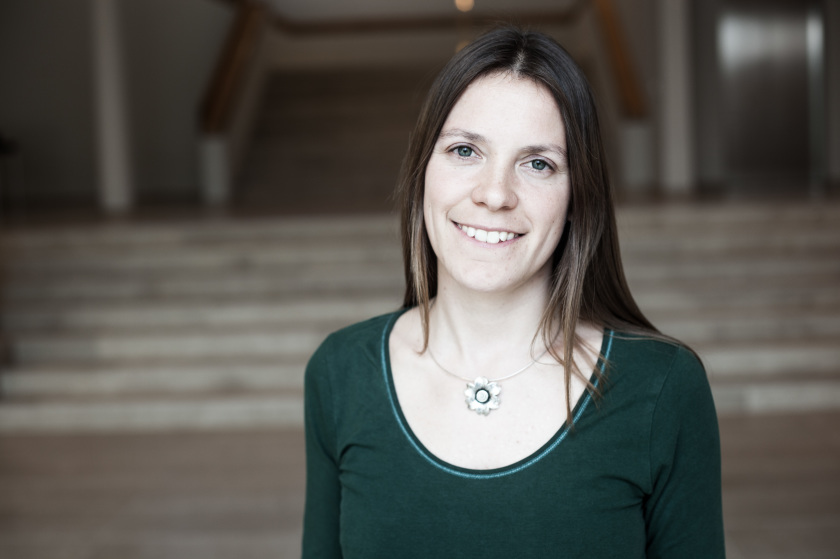HZB Freigeist Fellow Dr. Annika Bande

HZB Freigeist Fellow: Dr. Annika Bande
Foto: Mirko Krenzel for VolkswagenStiftung
As of early October, the HZB is home to one of the Volkswagen Foundation's Freigeist Fellows: Dr. Annika Bande recently joined Prof. Dr. Emad Aziz' institute "Methods for Material Development". There she will build up her own junior research group with initially three PhD students.
The theoretical chemist's research focus is on ultrafast energy transfer processes. Central to her research is what's known as interatomic Coulombic decay (ICD) where an electronically excited state is produced within an atom. Upon returning to its ground state, the atom transfers its excess energy to a neighboring atom or molecule through electronic Coulomb interactions. During this process, the electrons interact with each other even over long distances.
These ultrafast energy transfer processes have already been studied both theoretically and experimentally, including at the HZB, in a number of variations in atomic and molecular systems. As part of her theoretical work, Annika Bande was able to demonstrate that ICD must also be taking place in semiconductor nanocrystals called quantum dots. Furnishing experimental evidence is what Bande and her team is hoping to accomplish as part of her work with Emad Aziz' institute. In a unique approach the scientists observe the electrons' motion in calculations and with various types of spectroscopy. From this they expect numerous direction-giving contributions to the investigation of chemical processes and to materials' research.
"Here at the HZB, I encountered optimal conditions for experiments being done that support my theory," Annika Bande says. The Aziz group has already conducted ICD investigations on atomic systems in aqueous solution. Adds Bande: "I'll be able to build on this experience while also broadening the instutute's spectrum as I'll be focusing my own work mostly on quantum dots." The scientist, who is currently working on earning the title of 'professor' at Heidelberg University, expects this will help her glean insights that will prove relevant to future solar cells, among other things.
The 790,000 Euro Volkswagen Foundation's Freigeist Fellowship provides funding for a five-year period during this initial phase. According to the Foundation, funding is granted to "exceptional researchers who have already earned their doctoral degrees and whose goal it is to move between established research areas while conducting cutting-edge, 'risky' science."
Hannes Schlender
https://www.helmholtz-berlin.de/pubbin/news_seite?nid=14072;sprache=en
- Copy link
-
Fascinating archaeological find becomes a source of knowledge
The Bavarian State Office for the Preservation of Historical Monuments (BLfD) has sent a rare artefact from the Middle Bronze Age to Berlin for examination using cutting-edge, non-destructive methods. It is a 3,400-year-old bronze sword, unearthed during archaeological excavations in Nördlingen, Swabia, in 2023. Experts have been able to determine how the hilt and blade are connected, as well as how the rare and well-preserved decorations on the pommel were made. This has provided valuable insight into the craft techniques employed in southern Germany during the Bronze Age. The BLfD used 3D computed tomography and X-ray diffraction to analyse internal stresses at the Helmholtz-Zentrum Berlin (HZB), as well as X-ray fluorescence spectroscopy at a BESSY II beamline supervised by the Bundesanstalt für Materialforschung und -prüfung (BAM).
-
MXene for energy storage: More versatile than expected
MXene materials are promising candidates for a new energy storage technology. However, the processes by which the charge storage takes place were not yet fully understood. A team at HZB has examined, for the first time, individual MXene flakes to explore these processes in detail. Using the in situ Scanning transmission X-ray microscope 'MYSTIIC' at BESSY II, the scientists mapped the chemical states of Titanium atoms on the MXene flake surfaces. The results revealed two distinct redox reactions, depending on the electrolyte. This lays the groundwork for understanding charge transfer processes at the nanoscale and provides a basis for future research aimed at optimising pseudocapacitive energy storage devices.
-
Bernd Rech elected to the BR50 Board of Directors
The Scientific Director at Helmholt-Zentrum Berlin is the new face behind the "Natural Sciences" unit at Berlin Research 50 (BR50). Following the election in December 2025, the constituent meeting of the new BR50 Board of Directors took place on 22 January 2026.
Its members are Michael Hintermüller (Weierstrass Institute, WIAS), Noa K. Ha (German Centre for Integration and Migration Research, DeZIM), Volker Haucke (Leibniz Research Institute for Molecular Pharmacology, FMP), Uta Bielfeldt (German Rheumatism Research Centre Berlin, DRFZ) and Bernd Rech (HZB).
